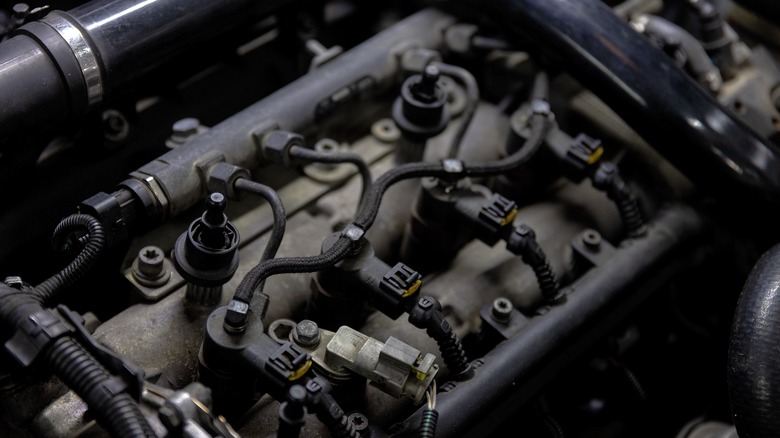How Much Should You Expect To Pay For A Used Car Engine?
The engine is the beating heart of a vehicle, and if it fails, most people will either invest in a new engine or simply buy a new car. However, if the vehicle is salvageable, and you don't want to shell out a ton of money for a brand-new engine, investing in a used engine can be a great alternative. So, how much should you expect to pay for a used car engine? According to industry estimates, a typical used engine is likely going to set you back between $800 and $3,500, but the exact price depends on the condition, the vehicle in question, and the mileage.
If you want to go even lower, self-service yards where customers remove engines themselves offer the cheapest used engines on the market — sometimes for under $200. Larger car parts suppliers showcase how used engine costs can scale dramatically with regard to the engine condition, the mileage, and the vehicle. Cheaper high-mileage 4-cylinder engines cost as low as $250 while larger low-mileage luxury car or truck engines go for more than $15,000.
Imported Japanese engines also cover a wide spread. For example, a rare performance engine like a 3-liter Toyota 2JZ GTE costs $17,000 whereas a commuter-friendly Toyota Corolla 1.8-liter engine costs $999. Ultimately, there are no one-size-fits-all solutions when it comes to engine replacement costs, but there are ways you can manage the expense more effectively. Having sourced many used engines, from a 1.8L VW four-cylinder to a 30-year-old Mercedes 500SL V8, I've learned the hard way of what to avoid, so this guide will help you skip my mistakes.
Tips for saving money on a used engine
Cross-shopping between private and professional suppliers is often the best first step to take, especially when it comes to warranty coverage. According to Turn 14 Distribution, "Most professional engine shops stand behind the engines they sell with a 30-day startup warranty, as opposed to buying from a private party." Therefore, some providers offer short-term warranty coverages, such as 30 days after purchase, while others, like Jasper remanufactured engines can extend that coverage to up to three years.
It is also crucial to check if all of the essential parts are included and whether all of them are covered by warranty. Even though the costs might be higher when buying from a professional supplier that offers warranty coverage, it can positively affect the car's resale value. On the other hand, if you are a mechanic or someone who knows how to work with engines, buying privately can save you a lot of money. When replacing an engine, it is also very important to consider labor costs, as different shops can charge different rates for the same task.
Sometimes the shop will allow you to source your own engine and only pay for the labor costs, so take your time to shop around. Don't commit immediately; compare quotes, ask around, insist on written estimates, and make sure it actually makes financial sense to buy a used engine. Lastly, be sure to also consider shipping costs since engines are heavy and can often cost hundreds of dollars to ship inside the U.S. while international shipping can cost thousands.
What to look for when buying a used engine
The mileage of the engine is a critical factor to consider, since it directly correlates with how much wear and tear the engine has endured during its lifespan. This also ties in nicely with servicing history, as a well-taken care of engine should be less troublesome in the future. It is also vital to double-check engine compatibility with your vehicle via an engine code, as not all engines that share the same block or displacement are actually the same.
A thorough engine inspection, including checking for leaks, torn belts, cracked hoses, weird stains, and faulty gaskets, is also something you do not want to miss. Inspecting a bad spark plug can also tell you a lot about how the engine operates. As such, pay close attention to carbon fouling, oil deposits, moisture, or worn electrodes. Be sure to perform a compression test and check the engine's oil condition to fully assess how the engine turns and whether its internal components are healthy.
Proper documentation and the title ensure the engine even has legally transferable ownership, so make sure to pay extra attention. Lastly, it's also a good idea to consider remanufactured and rebuilt engines, which, even though more expensive than a normal used engine, come with various benefits that can make the higher price worthwhile.


